Cyber security takes centre stage at Network XCyber security takes centre stage at Network X
On day two of the Network X conference in Amsterdam, telco execs and security experts looked outside the industry to examine how things like cyber security vulnerabilities, war, and regulation are impacting the market.
October 19, 2022

On day two of the Network X conference in Amsterdam, telco execs and security experts looked outside the industry to examine how things like cyber security vulnerabilities, war, and regulation are impacting the market.
The headline conference track on the second day of Network X in Amsterdam was an almost entirely security focussed affair, as ex-hackers turned security specialists and telco execs explored issues such as the rising number of hacks, securing networks in times of war, how regulation might or not be useful in this context, and who is ultimately responsibility for security when telcos distribute their operations across cloud platforms.
Dexter Thillien, Lead Analyst – Technology and Telecoms at EIU Connectivity kicked things off with a talk called ‘How will geopolitics, regulation and governance impact telecoms going forward?’
He discussed the risks to the global economy including current war in Ukraine and potential other flashpoints such as Taiwan, and how technology is increasingly politicised especially over microchip production. His assertion was the US and China are in a struggle for tech supremacy, and the rest of the world needs to pick a side – which is a bit of a depressing thought.
He pointed to current intervention in the tech space such as the CHIPS act – apparently we are likely to see more of that sort of thing in the future particularly around AI – and the possible fragmentation of telco and tech standards which might mean phones don’t work everywhere as they do currently, because of ever deepening global polarisation.
“Fragmentation is here to stay. I don’t think we’re going back to the globalised world we’ve seen the last 20 or 30 years in terms of technology,” he said.
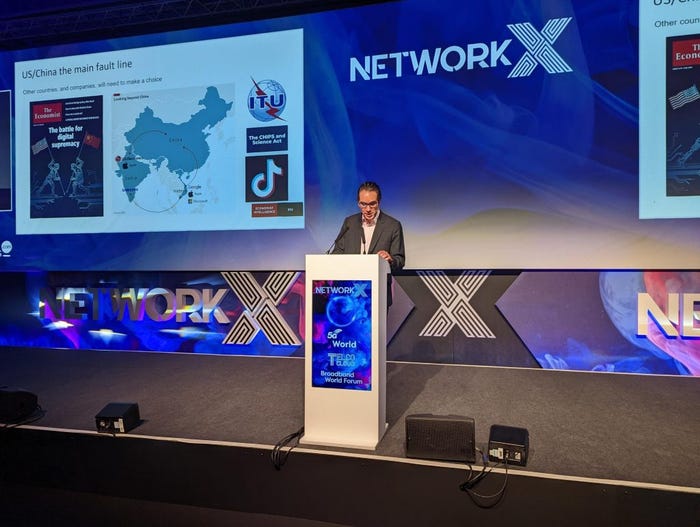
Dexter Thillien, Lead Analyst – Technology And Telecoms At Eiu Connectivity
Gregor Stegen, VP Sales & Business Development EMEA at Plume gave a talk called ‘Are we driving change or is change driving us?’
We were informed the ‘digital universe’ will be made up of 180 zettabytes by 2025, so do with that information what you will. He seemed to be advocating for some sort if innovation in customer service, which he calculates will bring in a 200% increase in ARPU.
The next big thing, he asserts, is greater analytics on user experience to encourage anticipative rather than a reactive approach to serving the customer, which is fair enough, but what that means to firms selling the ability to make phone calls or internet connections wasn’t really explored.
“Moving forward, our needs will evolve around personalization, and cross device experiences driven by the ever increasing number of devices inside of our homes. So from millions of locations, to billions of people, we’re now dealing with trillions of things,” he said before adding: “Everything is evolving at warp speed. And none of it matters.”
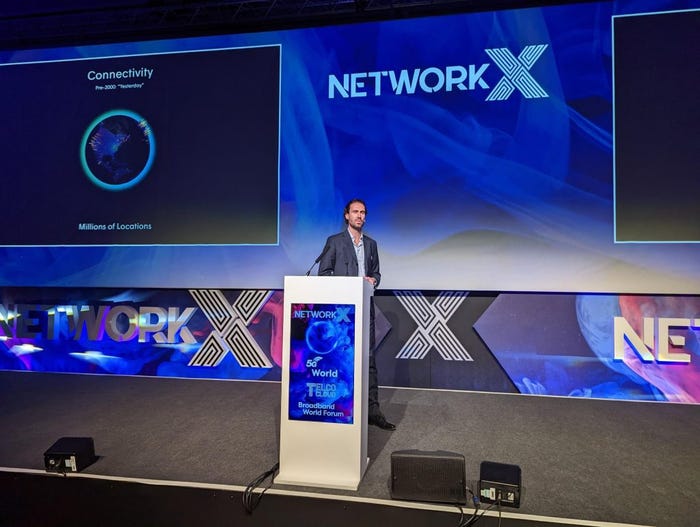
Gregor Stegen, Vp Sales &Amp; Business Development Emea At Plume
Hila Meller, Global Head of Sales at BT Security delivered a talk called ‘Developing a robust security framework to protect your business, country, and values from external threats.’
The usual themes around rising numbers of attacks were discussed that will be familiar to anyone that has read one of the reports analysts and security firms periodically produce on the matter, and she also thought that AI was going to be a hindrance as well as a help in the forever-war between security people and hackers as the tools fall into the wrong hands.
“5G networks are being utilised widely… that enables more IoT connectivity,” She said. “Factories are now way more connected to the internet. We have operational environments now connected to the internet, but they’re still very vulnerable and not necessarily built to deal with those kinds of threats.”
The overall point of the talk seemed to be about conveying how cyber attacks are on the rise, with various stats peppered in such as BT apparently blocks a million scam calls a day by way of evidence. Now we have decided to connect up everything to the internet, we are open to many more threats, was the claim being made. All those factories that have been persuaded to implement said smart tech into their operations must be delighted to hear that.
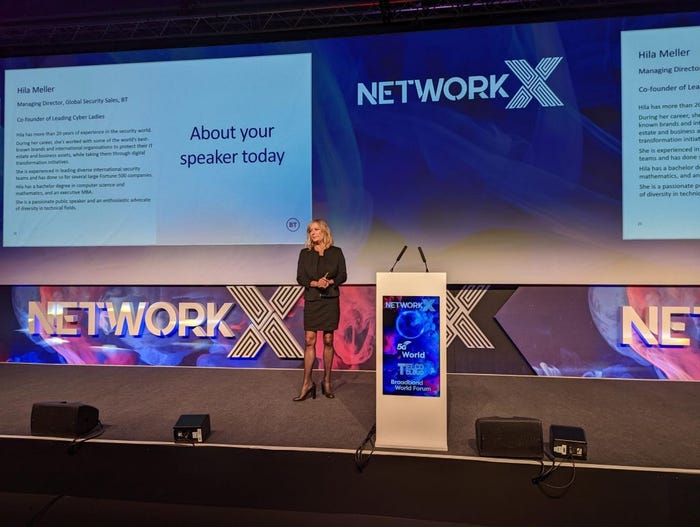
Hila Meller, Global Head Of Sales At Bt Security
Mikko Hyppönen, Principal Research Adviser, F-Secure was next up, gave a spirited talk and opened by explaining that he hunts ‘Russian cybercrime unicorns’, which is a great sounding thing to kick off your CV with.
He pointed out bank robbers no longer go into banks with guns because everything is digital now, that the internet has deleted geography, and that it is the best and the worst thing to have happened to us in that it creates new forms of crime.
As well as providing some intriguing detail on the scale of hacker organisations, including how they have business analysts that work out exactly how much a firm they wish to extort can afford, there was a general theme that it’s a bit much to expect the entire world to be security experts and that the onus should really be on corporations to make sure breaches are avoided.
“We really shouldn’t be putting the burden of responsibility to users who can’t take the burden, we should be taking away the responsibility from the users who can’t hold it we should put the responsibility to where it belongs,” he said. “If there’s a link that the user must never click on, that link shouldn’t be there on the desktop for the user to click on it and personalise. The responsibility for securing these devices belongs to the operating system manufacturers, to the security companies that built the security solutions, and to the telcos and operators that actually provide the connectivity through which these attacks reach the end users.”
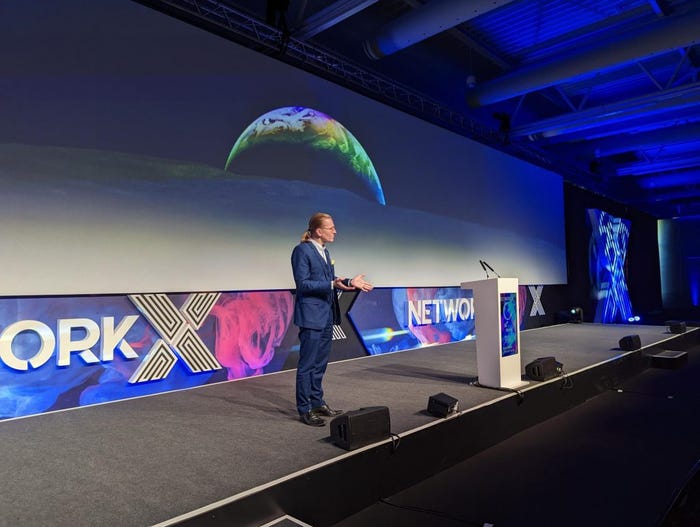
Mikko Hyppönen, Principal Research Adviser, F-Secure
Greg van der Gaast was next up, who has been named one of the ‘World’s 5 most infamous Hackers’, and has a job title of security, cyber and information expert. He was Apparently responsible for one of the largest hacks of all time, and after being promptly visited by some spooks in response, began working for the US government in a security capacity.
His position appears to be that much of the security industry is futile, and that as spending increases it fails to make much ground in reducing the problem, and advises a more holistic approach to security rather than fire fighting.
“We’re not making a dent in the problem,” he said. “And in fact we see security spending is increasing. It used to be a couple of percent of IT budgets now it’s about 12/13 inching up towards 15% of IT budgets. And we’re not really seeing a decrease in number of regions. incidents are the only going up faster than the spend. So it’s just not working.”
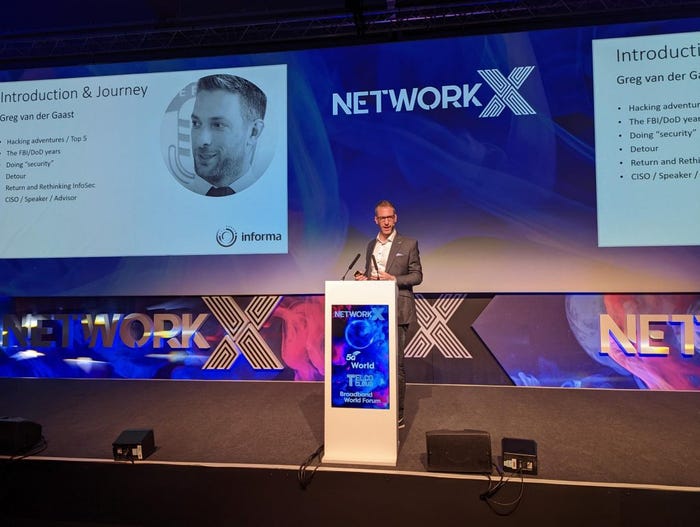
Greg Van Der Gaast
The final session was a panel discussion running under the title ‘How will the ever-influential geopolitical, regulatory and security environment impact Service Providers?’ a subject which was sufficiently wide that the panellists had plenty to go back and forth on.
Subjects discussed included the idea of victim blaming when it comes to cyber attacks, who’s ultimate responsibility it was to ensure security when telcos have migrated large parts of their operations onto public cloud platforms, how regulation is always two steps behind the issue, and whether regulation is actually very important at all since you can’t exactly regulate for companies to innovate better.
There were no clear answers to emerge from all this, but then the questions posed are very big ones, and will be chewed over by the industry in many forms over the coming years.
The biggest theme was that cyber threats are rising and are not unrelated to the actual war currently being waged in Ukraine. Much of this is not specific to telecoms firms of course, and there probably has never been an event where a security specialist took to the stage to explain the good news that they’ve finally cracked it and cyber attacks are falling off a cliff. The questions which zeroed in closer to our industry were around how much governments should steam in and regulate, and if there is a diffusion of responsibility as the business souls of telcos continue to be hosted in public cloud platforms owned by big tech.
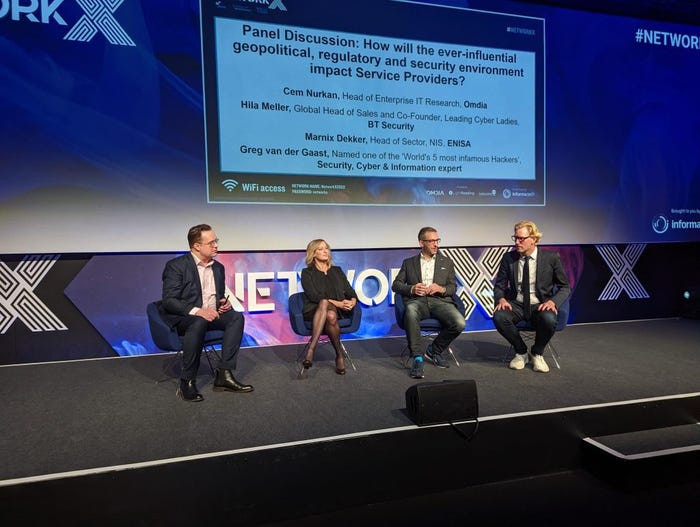
Get the latest news straight to your inbox. Register for the Telecoms.com newsletter here.
About the Author
You May Also Like










.png?width=300&auto=webp&quality=80&disable=upscale)


_1.jpg?width=300&auto=webp&quality=80&disable=upscale)